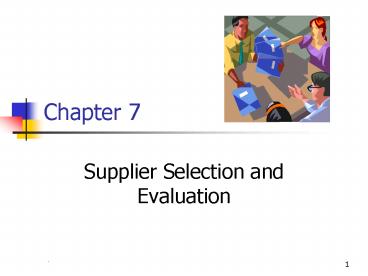Supplier Selection and Evaluation - PowerPoint PPT Presentation
1 / 15
Title:
Supplier Selection and Evaluation
Description:
Trade magazines. 6. Step 1. Identify and seek out information on ... Trade directory: Thomasnet.com. B2BYellowPages.com. Web sites of individual companies ... – PowerPoint PPT presentation
Number of Views:3320
Avg rating:5.0/5.0
Title: Supplier Selection and Evaluation
1
Chapter 7
- Supplier Selection and Evaluation
2
Contexts for supplier evaluation and
selection
- Reacting to a submitted requirement
- Proactive in early product development activity
- Proactive in developing preferred suppliers
- Insourcing/outsourcing decision analysis
3
The degree to which buyers search for new
sourcing information
Strategic Importance of Requirement
Low
High
Low
Minor to moderate information search
Major search efforts
Capability of Current Supplier
Minor to moderate information search
Minor information search
High
4
Supplier Evaluation and Selection
Steps involved . . .
5
Step 1. Identify and seek out information on
potential suppliers
- Current suppliers designated as a preferred
supplier - Sales representatives
- Internal databases on suppliers including
supplier literature - Trade magazines
6
Step 1. Identify and seek out information on
potential suppliers
- Internal users
- Trade shows
- Internet sources
- Trade directory Thomasnet.com
- B2BYellowPages.com
- Web sites of individual companies
- Purchasing colleagues
7
Step 2. A First Cut on identified potential
suppliers
- Suggested screening process
- Evaluation of survey information submitted by
suppliers - Financial ratios
8
Typical areas for supplier surveys
- Brief business history
- Key managers and their professional histories
- Major customers and references
- Questions on manufacturing capabilities and
capacity, process technologies, and quality
control - Financial condition and ratios
- Labor climate and labor relations
9
Step 3. Detailed evaluations on suppliers
making the first cut
- Further examination of the survey information
- Another RFI
- Dun Bradstreet Supplier Qualification Reports
- Contact former customers
- Site visits
- Prearrangements with supplier
- CFT
- Agenda
10
Step 4. Select supplier(s)
- Key evaluation criteria
- Process and technology capability
- Commitment to RD and continuous improvement
- Total Quality Management
- Management capabilities and potential for forging
a relationship - Labor Climate
- Cost Issues
- Financial Stability
- Suppliers Supply Management Capabilities
11
Developing a formal supplier evaluation instrument
- Necessary characteristics
- Incorporates a formal numeric scoring system
- Reflects the performance categories important to
the particular sourcing area - Flexible and adaptable for different supplier
evaluation situations
12
Developing a formal supplier evaluation
instrument The Steps
- Identify the categories of evaluation
- Assign a weight to each evaluation category
- Identify and weight subcategories as appropriate.
- Set-up a scoring scale
13
Using the evaluation instrument
Do a site visit and evaluate the
supplierresulting in a score
Use the results to pre-qualify suppliers or award
contacts, or to identify improvement opportunities
Issue of Deficiencies as compared to Performance
Problems
14
Miscellaneous supplier selection issues
- Local sources
- MBE Issues
- Size relatives
- Using a manufacturer vs. distributor
- Countertrade impositions
- Using foreign suppliers
15
Lets move on


























![Key Factors to Consider When Choosing a POF Shrink Film Supplier [Infographic] PowerPoint PPT Presentation](https://s3.amazonaws.com/images.powershow.com/10047849.th0.jpg?_=20240605036)




